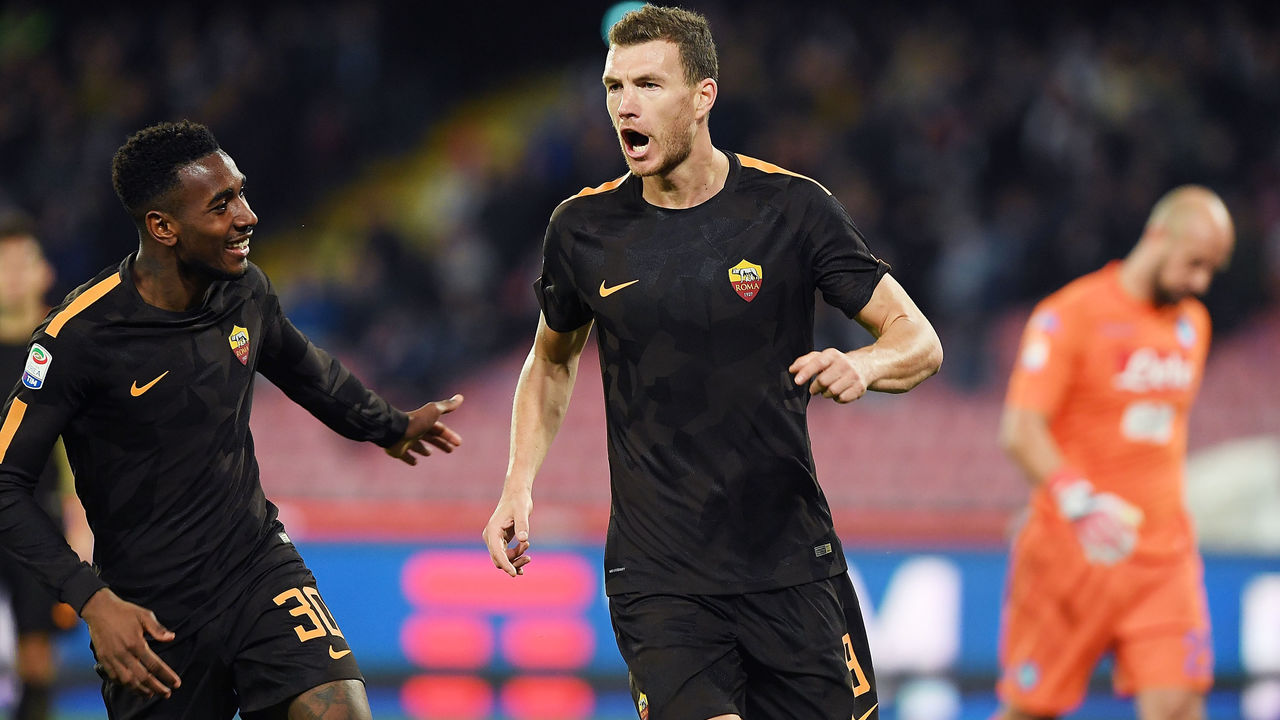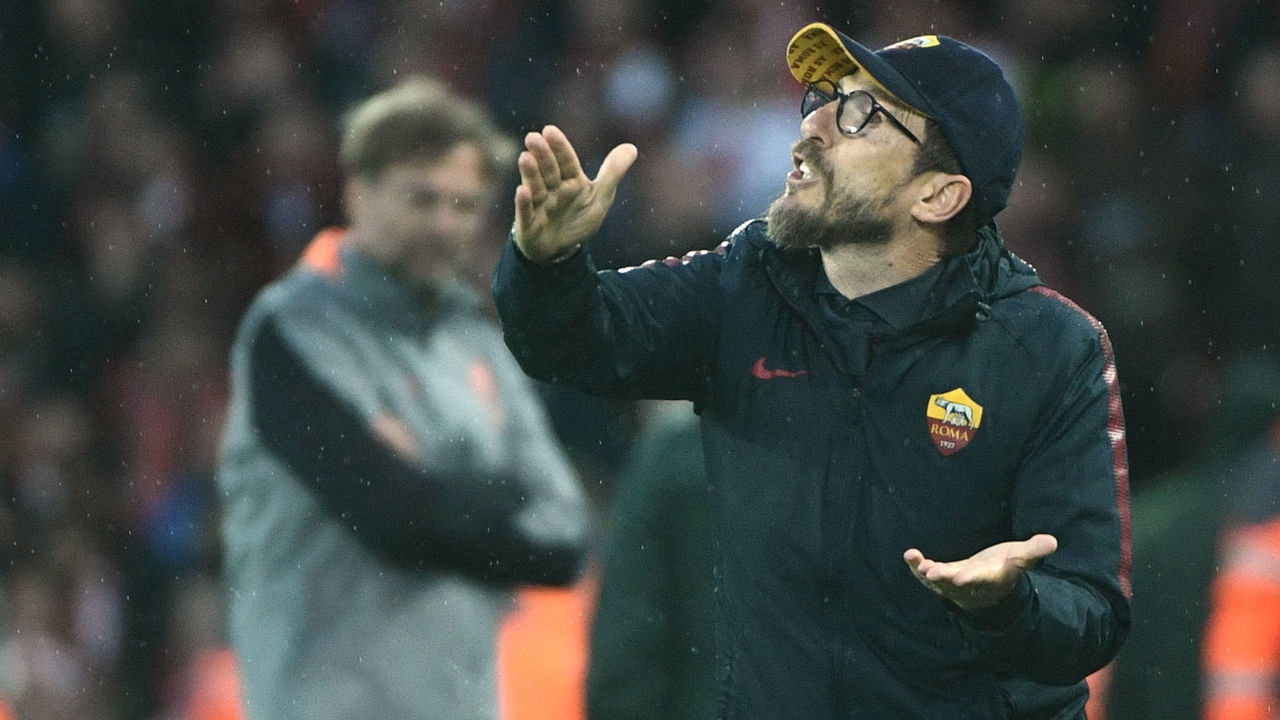Roma's resilience under Di Francesco generates hope of another comeback
Not everybody thinks it's possible for Roma to come back from a 5-2 first-leg deficit against Liverpool. But Eusebio Di Francesco only cares that those wearing his team's colours do. "Non-believers can stay home," repeated the manager over the weekend. As yet, we have had no reports of Romans returning their tickets for Wednesday's sold-out game at the Stadio Olimpico.
To the contrary, supporters have been turning the Italian capital red-and-yellow - responding to an appeal from the sporting director, Monchi, to hang scarves and flags from their windows. We are not yet back in the summer of 2001, when fans celebrated Roma's third-ever Serie A title by repainting street crossings in club colours, but there is little evidence this fanbase has given up hope.
It is not only the fact Roma came back from an almost identical position in the previous round - beating Barcelona 3-0 at home after losing 4-1 away - that has given rise to such defiant enthusiasm. Roma beat Chelsea by that same scoreline at the Stadio Olimpico in October. Eight of its 26 victories this season - including both of the two most recent in Serie A - have come by a three-goal margin or greater.
When Roma goalkeeper Alisson was asked about Mohamed Salah this week, he observed that his former teammate had always been abundantly talented but seemed to have achieved a greater self-confidence on Merseyside. Might the same go, though, for the teammates he left behind?
The Giallorossi are not necessarily playing at a higher level than they were last season when they finished as runners-up to Juventus in Serie A, and yet there has been a resilience in key moments that we have not always associated with this team. A week after losing at home to Milan - a result that dropped it out of the Champions League places - Roma travelled south to the Stadio San Paolo and beat league leader Napoli 4-2.

There was a dip in the winter; a run of seven games without a win. Even that, though, might have been an instructive experience. Rome is a city where the media spotlight burns brightly, and countless managers have lost their way under the glare. Many expected Di Francesco, who had never previously led a club of this stature, to do the same.
Instead, he emerged more clear-eyed than ever. Ask people around the club to name his best traits, and invariably they will mention his calmness and his capacity to 'sdrammatizzare' - to de-escalate the tension and pressure that his players might be feeling.
Alisson drew a contrast with Di Francesco's predecessor, Luciano Spalletti, whom he described as, "Very good, but missing a little bit of positive management in the changing room. For positive I mean a management that helps the team grow. Guiding a changing room is difficult, but he is missing that trait, where Di Francesco, who has grown himself during the season, has it."
More than anything, that positivity might be what Roma needs right now. There is no disguising the fact that the task before it is a tall one. It is not just that it needs to score a minimum of three goals but that it can ill-afford to give up chances at the other end. Roma is yet to concede a goal at home in Europe this season, but this Liverpool side has scored 18 in five away games.
Roma will almost certainly change its tactics for the second leg, reverting to the 4-3-3 it has used for most of the season. The three-man defence it deployed at Anfield was a disaster - leaving defenders constantly in one-on-one situations against Liverpool's far quicker forwards. The hope is that this change will permit Roma to keep a man free for additional cover.
Yet Di Francesco understands that psychology has as big a role to play here as tactics. He has long been fond of reminding his players that "timing is everything in football." A goal at the right moment could do more to unsettle Liverpool than anything he might draw up on a chalkboard.

Against Barcelona, Roma was able to open the scoring after just six minutes - planting doubt in the minds of its opponent where previously there had been none. A repeat of Edin Dzeko's early strike in that game could change the complexion of this tie.
Of course, it is not possible to guarantee such a thing, but Di Francesco will call on his team to do as it did back then: look for the most direct ball early and often. He and his players see weaknesses in Liverpool's defence to be exploited - as they did at the end of the first leg - but to do so will require the right mix of courage and good fortune in key moments.
In an interview for the Guardian newspaper before the first leg, Di Francesco sought to offer a bit more context to the Barcelona win. "I'd like to say that me and my staff did a really important job working on the players' heads, but not only that," he explained.
"We gave them technical and tactical instructions that were very precise, and which they embraced. I believe that aspect, the mutuality, is fundamental. Because when you propose an idea, if the other person does not believe in it, then the chances of pulling it off are slim."
That Di Francesco's players have bought into his message is evident. None of those who have spoken publicly in the past seven days have given off an air of defeat. Radja Nainggolan defined a potential comeback as "difficult, but not impossible." Patrik Schick insisted "we can score three goals." Alisson put Roma's chances of reaching the final at a solid 50 percent.
Perhaps they are in for a rude awakening. The blunt truth is that Roma was outclassed for the vast majority of the first leg. Liverpool itself knows a thing about improbable comebacks, though, having authored perhaps the greatest in European Cup history when it came from 3-0 down to beat Milan in the 2005 final.
So why not hope against hope? Better to be believe and risk disappointment, than stay home and risk missing out on a miracle instead.
(Photos courtesy: Getty Images)
HEADLINES
- Serie A preview: Focus on Inter going into potential title-deciding derby
- Serie A secures extra UCL place, Bundesliga and EPL still in contention
- UEL roundup: Leverkusen to face Roma in semis after going 44 games unbeaten
- Atalanta bounce Liverpool as Klopp's final season suffers new blow
- De Rossi to remain Roma coach for 'foreseeable future'